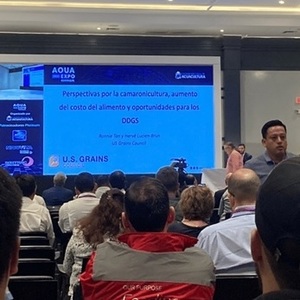USGC spreads awareness of DDGS use in shrimp diets

SOURCE: U.S. Grains Council
November 3, 2022
BY U.S. Grains Council
As the shrimp sector in Ecuador continues to grow, the U.S. Grains Council is finding ways to include distillers dried grains with solubles (DDGS) in nutrition conversations. Recently, the organization participated in the AquaExpo Congress in Guayaquil, Ecuador, hosted by the Ecuadorian National Chamber of Aquaculture.
Because of the positive results of studies being conducted in Indonesia on the inclusion of higher protein corn co-products in shrimp diets, the Council sponsored a speaker, Hervé Lucien-Brun, to present the findings of those studies in Ecuador, while creating awareness among Ecuadorian nutritionists about the potential of this ingredient.
Some shrimp feed producers in Ecuador have already been using traditional DDGS, however, only a few have started using the other, higher-protein corn co-products. The Council’s Latin America (LTA) regional office began promoting those other options in Ecuador in March and participating in this event is the next step in building on its promotion efforts in the country.
Advertisement
Advertisement
“The Council will continue increasing its DDGS promotion efforts with producers of aqua feed throughout Latin America. In Ecuador, the current world leader in farmed shrimp exports, we have the largest potential to increase DDGS usage in shrimp feed production in the region. The country produces around 1.5 million metric tons (MMT) of shrimp feed per year, containing 25 to 45 percent protein,” said Ana Ballesteros, USGC’s LTA marketing director.
“Traditional DDGS and other higher-protein corn co-products can be a cost-effective option for these diets and we will be working to ensure Ecuadorian nutritionists are aware of this through additional training, conferences and connections with U.S. suppliers. We would also hope to do trials suited to the Ecuadorian production conditions in the future.”
The AquaExpo Congress is the premiere event for the burgeoning shrimp sector, gathering different stakeholders in the value chain for the number one agricultural export in Ecuador: shrimp. Nearly 1,200 participants attended the conference and 4,000 visited the trade show. The 2022 edition was the biggest event to date for the organizers.
Outside the Council’s presentation, the event also highlighted topics including health management in shrimp culture systems; nutrition and feeding strategies; production systems management; market situation and trends; new technologies; water and soil quality management; sustainability and certifications; and genetic improvement.
Advertisement
Advertisement
“Presenting at AquaExpo was a great learning experience. Not only were we able to talk about the proven benefits of DDGS in shrimp diets before a technical audience, but we also had a first-hand experience of what the sector looks like and the topics relevant to them. Working with an expert on the Ecuadorian shrimp market provided us with relevant and updated information on the market size and with ideas on how to continue engaging with this sector in the future,” Ballesteros said.
While this promotion effort is still in the beginning stages, the Council looks forward to offering trade education through research to help increase DDGS sales in the aquaculture arena in Ecuador.
Related Stories
The U.S. EPA on May 14 delivered two RFS rulemakings to the White House OMB, beginning the interagency review process. One rule focuses on RFS RVOs and the other focuses on a partial waiver of the 2024 cellulosic RVO.
The U.S. EPA on May 15 released data showing nearly 1.79 billion RINs were generated under the RFS in April, down from 2.09 million generated during the same month of last year. Total RIN generation for the first four months of 2025 was 7.12 billion.
Calumet Inc. on May 9 announced sustainable aviation fuel (SAF) capacity at its Montana Renewables biorefinery is expected to reach 120 MMgy to 150 MMgy sooner than previously reported for a fraction of the originally expected cost.
Tidewater Renewables on May 8 announced that its 3,000-barrel-per-day renewable diesel plant in Prince George, British Columbia, operated at 75% capacity during the first quarter, up from 71% during the same period of last year.
Aemetis Inc. released Q1 results on May 8, reporting increased biogas production, progress with efficiency improvements at the Keyes ethanol plant, and resumed biodiesel deliveries. Financing activities are also underway for a proposed SAF project.
Upcoming Events










